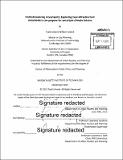| dc.contributor.advisor | Lawrence Susskind. | en_US |
| dc.contributor.author | Schenk, Todd Edward William | en_US |
| dc.contributor.other | Massachusetts Institute of Technology. Department of Urban Studies and Planning. | en_US |
| dc.date.accessioned | 2016-02-29T15:03:25Z | |
| dc.date.available | 2016-02-29T15:03:25Z | |
| dc.date.copyright | 2015 | en_US |
| dc.date.issued | 2015 | en_US |
| dc.identifier.uri | http://hdl.handle.net/1721.1/101372 | |
| dc.description | Thesis: Ph. D. in Public Policy and Planning, Massachusetts Institute of Technology, Department of Urban Studies and Planning, 2015. | en_US |
| dc.description | Cataloged from PDF version of thesis. | en_US |
| dc.description | Includes bibliographical references (pages 355-384). | en_US |
| dc.description.abstract | Climate change poses a range of threats to our infrastructure systems. Efforts to respond are complicated by the uncertainty and complexity involved. The uncertainties are pervasive, going beyond scientific and technical issues to include significant governance challenges. This dissertation examines how stakeholders are likely to make project-level decisions in practice, and how we can support better processes. It considers the implications of using multiple scenarios as a way to frame uncertainty, and of bringing multiple stakeholders together for decision-making. It is also concerned with the differences across governance regimes, focusing on Boston, Singapore and Rotterdam. The research process featured a role-play simulation (RPS) exercise run with participants as a way to introduce issues and facilitate experimentation. Participants overwhelmingly favored flexible approaches as a way to proceed despite uncertainties, making the best possible decisions today while leaving options open as conditions change and learning occurs. Unfortunately, this research suggests that there are substantial barriers to institutionalizing flexibility. Participants were also extremely positive on the use of scenarios as a way to frame uncertainty. However, the exercise runs underscored the challenges associated with their use; scenarios encourage users to consider the implications of an uncertain future, but can concurrently deny them the single standards they are familiar with using. Another key finding is that adaptation planning efforts are deliberative processes in which facilitation, the behavior of participants, and process design matter; the choices participants made had significant implications on exercise outcomes. Finally, participants behaved differently across the three cities, underscoring the importance of wider governance norms. This dissertation concludes with three recommendations: First, the development of boundary organizations that can foster the dynamic institutions necessary to advance flexible adaptation. Second, given the importance of salient, credible and legitimate scientific and technical information, I recommend the use of joint fact finding (JFF) techniques. Because of the dynamic nature of climate adaptation, I suggest that JFF be explicitly iterative in nature. Scenarios can help JFF groups to consider the uncertainties involved. Third, I recommend that researchers consider using exercises as tools for action research, particularly when considering nascent and complex issues like climate adaptation. | en_US |
| dc.description.statementofresponsibility | by Todd Edward William Schenk. | en_US |
| dc.format.extent | 384 pages | en_US |
| dc.language.iso | eng | en_US |
| dc.publisher | Massachusetts Institute of Technology | en_US |
| dc.rights | M.I.T. theses are protected by copyright. They may be viewed from this source for any purpose, but reproduction or distribution in any format is prohibited without written permission. See provided URL for inquiries about permission. | en_US |
| dc.rights.uri | http://dspace.mit.edu/handle/1721.1/7582 | en_US |
| dc.subject | Urban Studies and Planning. | en_US |
| dc.title | Institutionalizing uncertainty : exploring how infrastructure stakeholders can prepare for uncertain climate futures | en_US |
| dc.title.alternative | Exploring how infrastructure stakeholders can prepare for uncertain climate futures | en_US |
| dc.type | Thesis | en_US |
| dc.description.degree | Ph. D. in Public Policy and Planning | en_US |
| dc.contributor.department | Massachusetts Institute of Technology. Department of Urban Studies and Planning | |
| dc.identifier.oclc | 939632385 | en_US |
